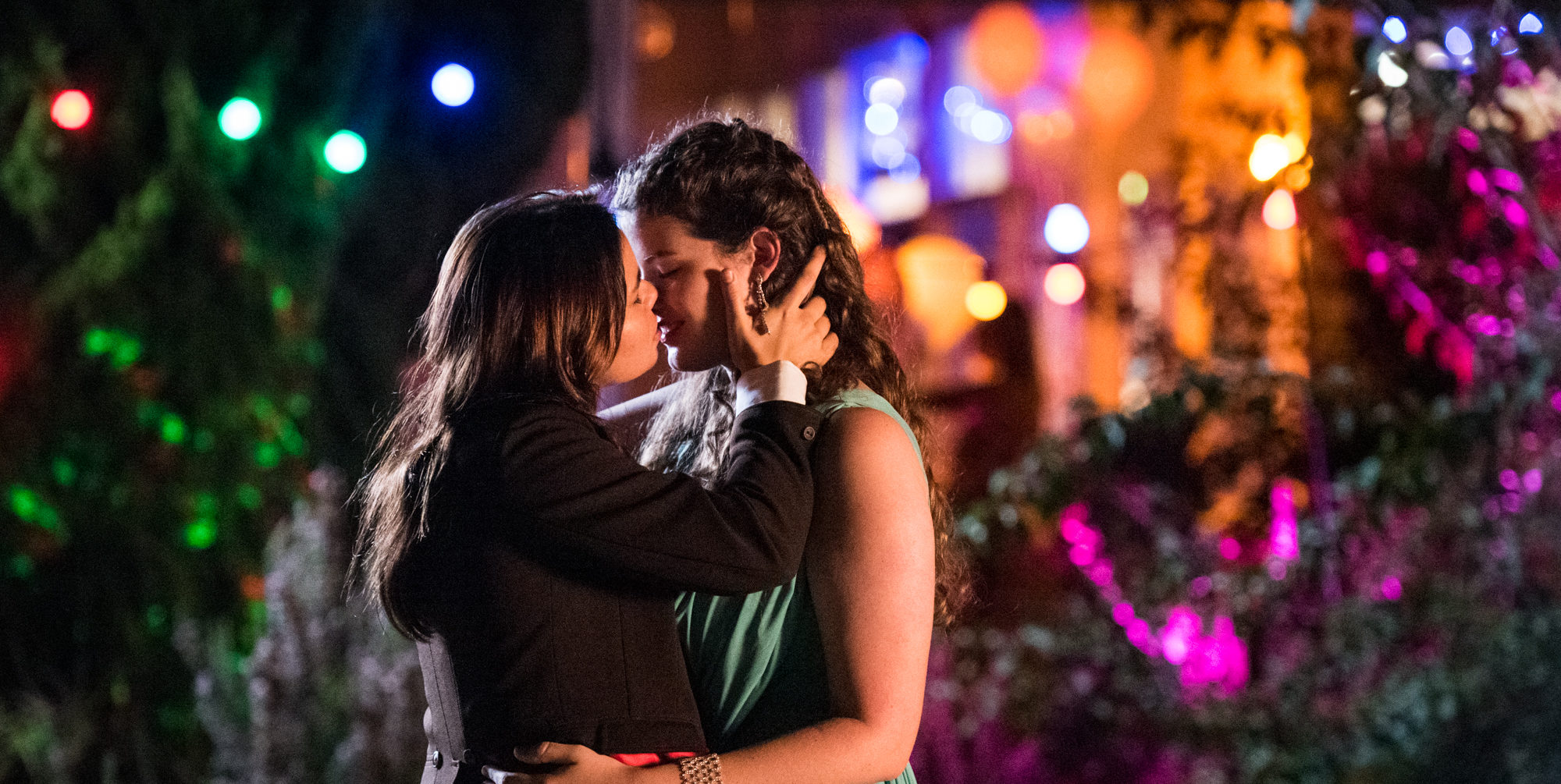Just as stories of gay men have tended to overshadow or even obscure lesbian history, until very recently the same has been true of cinematic depictions: the boys in the band hog the limelight. Ellie & Abbie (& Ellie’s Dead Aunt) (Monica Zanetti, 2020), which became the first Australian film to open the Mardi Gras Film Festival (MGFF) in February last year, brings lesbians to the fore for the change.
Ellie & Abbie originated in 2017 as a Zanetti-penned and -directed play that debuted at the Depot Theatre in Marrickville, in her home town of Sydney. The original production starred Sophie Hawkshaw as driven high school student Ellie and Geraldine Viswanathan as her secret crush, the more forthright Abbie. With Viswanathan leaving the country to pursue a now-flourishing career in Los Angeles, non-binary actor Zoe Terakes stepped in to play Abbie in the big-screen adaptation.
Family is central to Zanetti’s film. Things initially get complicated when Ellie’s mum, Erica (Marta Dusseldorp), inadvertently finds out that her daughter is queer, but Ellie has solid support from her honorary aunt Patty (Rachel House), an out lesbian herself. She also reluctantly leans on maternal aunt and lesbian Tara (played by out actor Julia Billington, who previously appeared in the web series Starting from … Now) – somewhat surprisingly, given Tara died in the 1980s. A cute flourish, this ghostly appearance to Ellie (and only Ellie) harks back to Zanetti’s debut screenplay for the short film Guardian Elf (Melissa Bonne, 2013), which also featured a fantastical visitation. Eking out chuckles from Tara offering not entirely up-to-date advice on teenage love and queer politics, Ellie & Abbie leans into its kooky genre twist. While the film also has heartbreak, it’s a predominantly big-hearted lesbian rom-com with a strong matriarchal message. As Zanetti tells me,
There’s a gaping hole where this content is missing – where we can have stories like this [that] can comfortably fit in a family space. When we can have stories like this, that’s when we really start to feel progress.
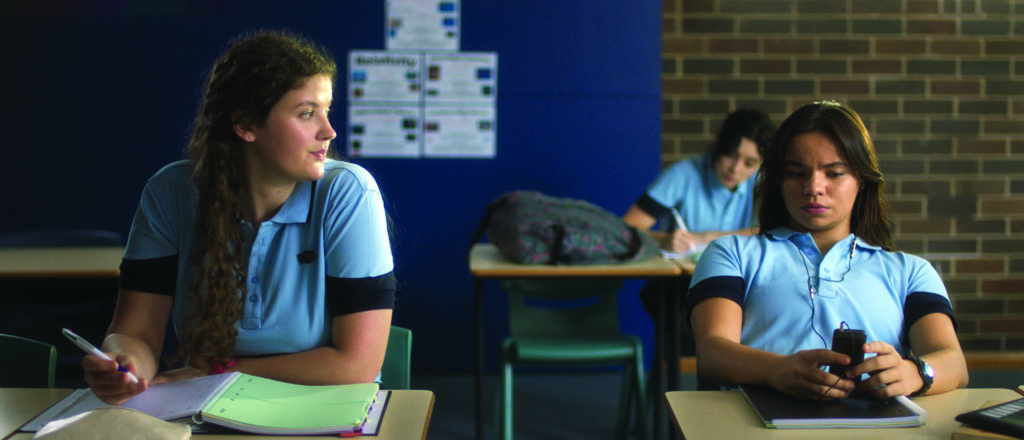
Ellie & Abbie is the sort of feel-good film its director craved while growing up. It’s also a smart commentary on that absence, as well as the bigger picture of how lesbian contribution to the queer-rights movement has been overlooked. In Zanetti’s youth, there weren’t many examples of this kind of narrative on screen, to say the least. ‘In Australia, I think the closest film I can think of, and I definitely don’t think you’d call it a lesbian film, was All Men Are Liars [Gerard Lee, 1995],’ she says. Starring Toni Pearen, Lee’s film – a riff on the William Shakespeare play Twelfth Night, or What You Will – features Pearen’s character, Angela, falling for a man (David Price) dressed as a woman. That All Men Are Liars was Zanetti’s touchstone speaks volumes about the dearth of Australian-made lesbian stories. Even a rare exception like Ana Kokkinos’ 1994 directorial debut Only the Brave ended up being overtaken in the public consciousness by her gay-centric follow-up Head On (1998).
When I first spoke to Zanetti about Ellie & Abbie for SBS Movies, before its MGFF debut, she credited writer, director and producer Julie Kalceff and her web series Starting from … Now as a significant influence on her career:
Julie fought to get that made. She just pushed and pushed. Watching her do that gave me confidence, because I remember back when I wrote [debut feature] Skin Deep [Jonnie Leahy, 2015], everyone kept telling me, ‘Oh, you don’t want to get pigeonholed doing queer stories.’ And then seeing someone like Julie change the minds of people in positions of power made me like, ‘Nup, fuck it. If I want to keep telling queer stories, I will.’[1]Monica Zanetti, quoted in Stephen A Russell, ‘Mardi Gras Film Festival Opens with Aus Lesbian Rom-com’, SBS Movies, 13 February 2020, <https://www.sbs.com.au/movies/article/2020/02/10/mardi-gras-film-festival-opens-aus-lesbian-rom-com>, accessed 5 November 2020.
One of her favourite moments in Ellie & Abbie sees Ellie taken aback as she discusses with her mum why she was oblivious to Tara’s political activism. In this way, her aunt’s ghostly reappearance is a spiritual reclamation, Zanetti tells me:
That’s one of the really nice conversations […] when her mum says, ‘Well, if you want to know them, you have to go looking for them’ […] and it’s true. If you do look, you’ll find these wonderful stories. So yeah, I think that’s exactly what Tara’s a metaphor for.
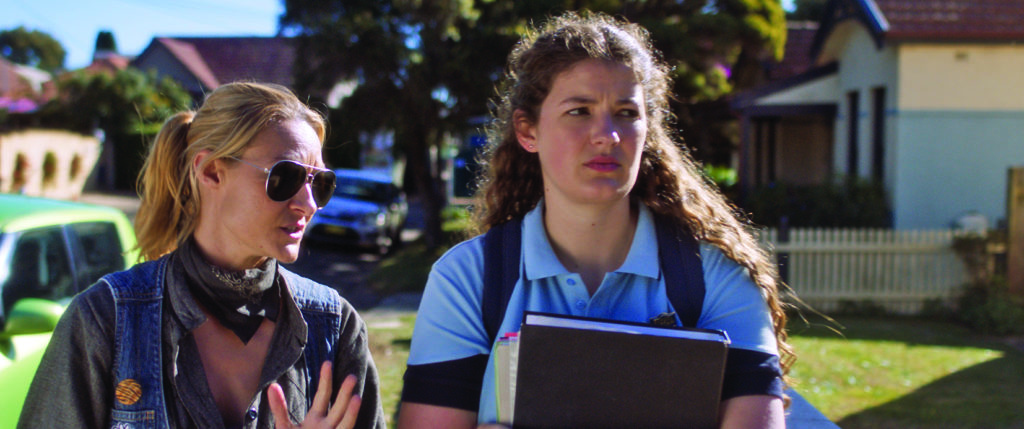
Warriors and Slayers
In the absence of visible representation of lesbian subjects on screen, Zanetti – like many before her – turned to queer coding, in which queer subtexts are read into works that do not explicitly contain such. Within the LGBTQIA+ community, queer coding is a well-worn way to glimpse a reflection of ourselves when there are few other opportunities to do so – and to do so safely, without the risk of outing oneself to heterosexual friends or family. It can offer both clandestine thrills and the crushing lows of secret shame. Zanetti recalls these formative experiences well:
The queer content I would watch, I would find it by myself alone on the internet, and that’s where I found other like-minded people and communities [whom] you could also speak to when you’d fall in love with a TV character you’d know that you can’t.
The most notable queer-coded character for Zanetti was Sarah Michelle Gellar’s titular high school hero in Buffy the Vampire Slayer. ‘You can’t keep talking to your friends about that kind of love, because they’re going to start questioning you,’ she says. While Zanetti could enjoy the Joss Whedon–created pop-culture sensation with mates, she’d turn to online fan communities and message boards to share her true feelings for Gellar’s mould-breaking monster hunter. ‘You could find people who are like you: “Yes, I’m also in love with Buffy.”’
Though that show would go on to feature a lesbian romance between Buffy’s best friend (and powerful witch) Willow Rosenberg (Alyson Hannigan) and the shy, also magical Tara (Amber Benson), the latter was subsequently shockingly killed off, driving the former to the dark side. The scraps thrown to such online communities, and the tendency towards tragedy when such stories are centred, are discussed at length in the rollicking documentary Queering the Script (Gabrielle Zilkha, 2019), which – in the words of The Hollywood Reporter’s Beandrea July – ‘documents the history of queer women on television and how the internet gave birth to an influential and too-often overlooked community of queer women fans’[2]Beandrea July, ‘Queering the Script: Film Review | Outfest 2019’, The Hollywood Reporter, 22 July 2019, <https://www.hollywoodreporter.com/review/queering-script-review-1225949>, accessed 5 November 2020. (it also screened at MGFF last year). Dissecting the slaying of Tara and other lesbian characters in non-queer-centric TV shows, Queering the Script looks at the ‘will they / won’t they?’ energy between Xena: Warrior Princess’ titular protagonist (Lucy Lawless) and her ‘companion’ Gabrielle (Renée O’Connor). Never explicitly consummated, their relationship was leapt on by a vocal lesbian fan base. Zanetti says, of the Xena fervour she shared,
We found each other on the internet being like, ‘Xena is queer, yeah?’ It was really fascinating, because even though we could see what was happening, it was those conversations and the communities online that blatantly outed that. So, again, you would look for the representation everywhere, anywhere you could find it.
She recalls how important it was for her to see lesbian love step out from the shadows of suggestion and into the sun of recognition with Tara and Willow, while acknowledging that their volatile relationship was fraught even before its tragic denouement:
I’m so glad that relationship existed, but it wasn’t one that I saw myself in. You look back on it and it’s quite toxic in moments, so it wasn’t necessarily a great example – but it was kind of all we had.
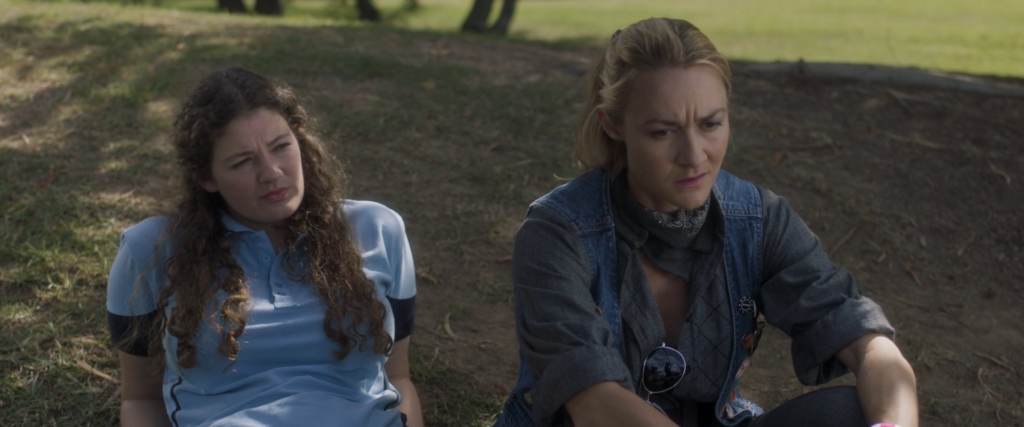
Representation matters
Selected as a program spotlight of the 2020 Melbourne International Film Festival (MIFF), Ellie & Abbie was forced online in the face of the COVID-19 pandemic. For that reason, planned appearances at LGBTQIA+ festivals BFI Flare in London and Frameline in San Francisco were scuppered; but, for Zanetti, the MIFF pivot wasn’t a disaster. While she had always dreamed of showing Ellie & Abbie in a cinema under the umbrella of MIFF, she was still hugely excited about the digital platform offered in August, as it allowed for people tentatively navigating their sexual identity to engage with the film privately if they so chose:
There’s nothing wrong with it being a private thing you want to watch on your laptop or phone secretly. But it’s also lovely to be able to go to a cinema with your friends and not necessarily feel like you’re outing yourself by suggesting it.
Friends contacted her to say that they’d be buying young relatives who had recently come out a ticket, furthering her belief that the online space offers greater access.
I did always know that this film was gonna thrive on a streaming service. Obviously that has come a bit earlier than we were expecting, but that’s the really exciting part of it […] because that’s exactly who I made it for, and that’s really rewarding.
Growing up with two gay uncles she was close with, one of whom sadly died when she was ten, Zanetti says her own path to coming out wasn’t too traumatic thanks to open-minded parents; but it was still a journey that she navigated on her own terms and timeline. A lack of lesbian visibility on film and television contributed to her nerves, which inspired the plotline in which Ellie is reticent to tell her mum about her sexuality. References within the film to significant queer-rights battles beyond Mardi Gras are also important. When seminal LGBTQIA+ achievements are celebrated, it’s too often through the lens of gay male achievement at the expense of lesbian history.
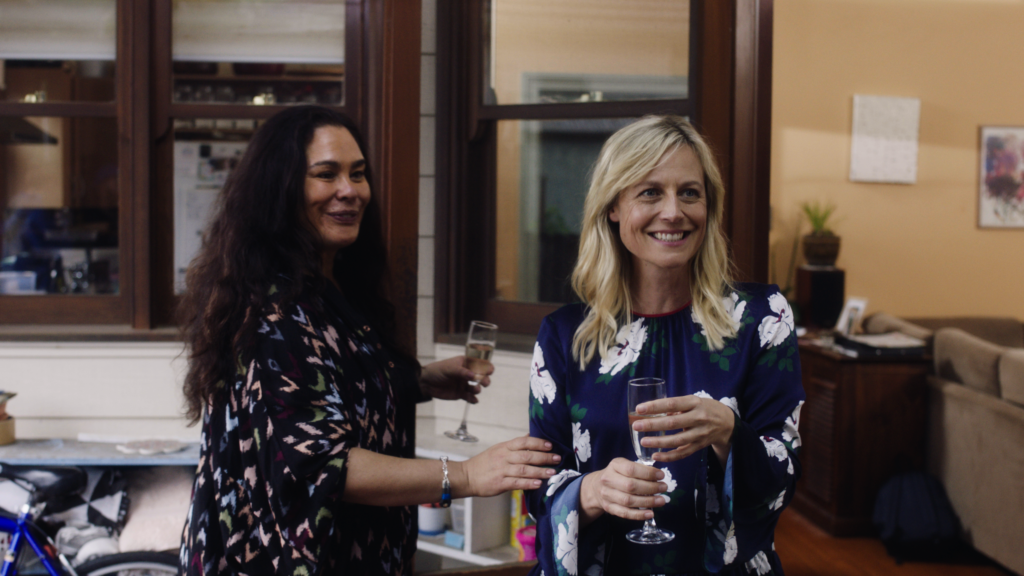
This is a frustration shared by filmmaker Abbie ‘AP’ Pobjoy. Her short Backing Up Bilitis (2018) debuted at the 2019 St Kilda Film Festival, and was set to screen at last year’s Melbourne Queer Film Festival, which also ended up being cut short by COVID and going digital. It depicts a teenage lesbian who finds inspiration in real-life activists Phyllis Papps and Francesca Curtis, who came out together on the ABC TV show This Day Tonight in 1970, eight years before Mardi Gras.[3]See Jordan Hirst, ‘Fifty Years Ago Today, Lesbian Couple Phyllis and Francesca Came Out on Aussie TV’, QNews, 27 April 2020, <https://qnews.com.au/fifty-years-ago-lesbian-couple-phyllis-and-francesca-came-out-on-aussie-tv/>, accessed 5 November 2020. As Pobjoy told me in an interview for The Age:
That’s what Bilitis is trying to prove, that the gay rights movement is actually heavily linked to the women’s liberation movement. It’s not someone fighting a bigger battle than anybody else. We’re all fighting the same fight. It’s just about sharing that spotlight.[4]Abbie Pobjoy, quoted in Stephen A Russell, ‘Direct from the Heart, Trans Filmmaker Pays First Nations Debt’, The Age, 15 July 2020, <https://www.theage.com.au/culture/movies/straight-from-the-heart-trans-filmmaker-pays-first-nations-debt-20200715-p55c7a.html?btis>, accessed 5 November 2020.
Zanetti is surprised that she didn’t know their story. Pointing reverently to the trans women of colour who started the Stonewall riots in New York in 1969, she agrees that it’s essential to recognise all contributions. There’s a subtle nod in Ellie & Abbie to the origins of Dykes on Bikes, a group that makes regular appearances at Pride marches worldwide. During Sydney’s Mardi Gras protest in 1978, many motorcycle-riding lesbians ferried people out of harm’s way, so Zanetti made Patty an Uber driver who offers safe transport to Ellie. ‘That’s something that [I] and Rachel discussed,’ she says.
Zanetti grants that the terrible toll of the HIV/AIDS epidemic, and the horrific loss of so many queer men, played a role in centring their history in the LGBTQIA+ movement. Like Pobjoy, she just wishes there was more room to celebrate their lesbian sisters, too. A contact at BFI Flare put her onto Croc-a-Dyke Dundee: The Legend of Dawn O’Donnell (Fiona Cunningham-Reid, 2014), about the life of the titular Australian queer icon. A young tearaway sent to a convent, O’Donnell allowed her love of ice to take her to Paris as a professional skater. When an injury brought her back to Sydney, a life of notoriety awaited. Marriage to a man lasted all of two months, with O’Donnell unashamedly living the rest of her life as an out lesbian. Opening a string of initially illegal gay bars along Oxford Street, she helped kickstart Sydney’s queer scene, building an empire of sex shops, brothels, saunas and – somewhat off brand – butcher’s shops. She was a big player in the early days of Mardi Gras, but soon became disillusioned with its corporatisation. Supporting the drag scene, she helped forge a satellite hotspot centred on The Imperial Hotel on Erskineville Road.[5]See Tony Stephens, ‘A Leading Lady of Sydney’s Gay Club Scene’, The Sydney Morning Herald, 13 June 2007, <https://www.smh.com.au/national/a-leading-lady-of-sydneys-gay-club-scene-20070613-gdqdcx.html>, accessed 5 November 2020. ‘That move made a new community, because Newtown is now a big gay area,’ Zanetti notes.
Indeed, talking head Stephan Elliott admits in the documentary that he got most of his material for The Adventures of Priscilla, Queen of the Desert (1994) from sitting in O’Donnell’s joints. In business with some of the city’s shadiest dealers, she was soon at the centre of rumours of dubious deals with gangsters, arson and even murder, a roguish ambiguity she clearly relished. But she also put up bail for gay men in police custody and raised much-needed funds during the HIV/AIDS crisis.[6]See Ian Johnson, ‘Dawn O’Donnell – Gay Market Mistress’, Gay Market News, 17 June 2007, <http://www.gaymarketnews.com/2007/06/dawn-odonnell-gay-market-mistress.html>, accessed 5 November 2020. As reviewer David Pountain puts it, ‘Despite (and perhaps, in part, because of) this mystery surrounding Dawn’s life, what we do know about her is enough to make her an enjoyable, sympathetic presence [in the documentary].’[7]David Pountain, ‘Documentary Review: Croc a Dyke Dundee (2014)’, FilmDoo, 25 November 2015, <https://www.filmdoo.com/blog/2015/11/25/documentary-review-croc-a-dyke-dundee-2014/>, accessed 5 November 2020.
For Zanetti, ‘She was fascinating and dodgy as all hell [… My reaction was] “Who is this woman?”’ Hearing stories like hers is essential, she says, which is why she hopes to make O’Donnell’s life the subject of her next project:
I am well plugged into this. I’m the target audience for a woman like this. I’m quite obsessed with her. I think she needs a whole TV show. I think she needs an Underbelly series.
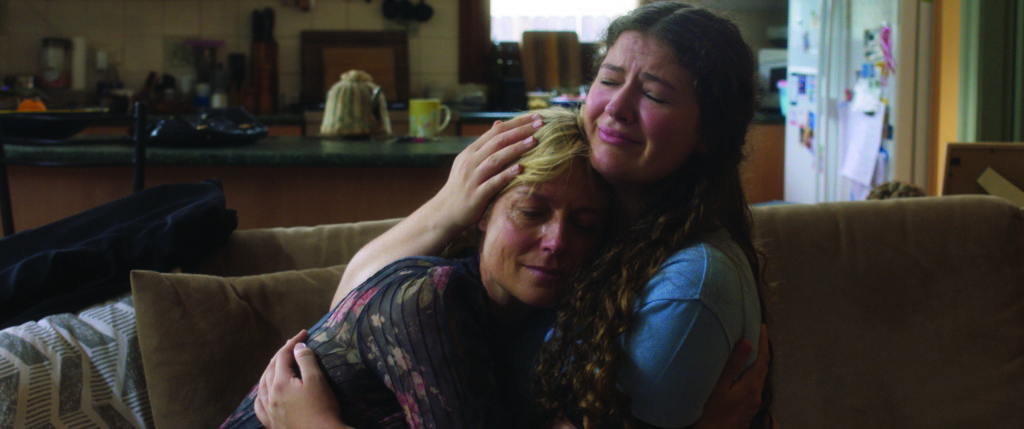
Working together
While Ellie & Abbie was rustled up on a microscopic budget and a rapid ten-day shoot, the determination to get it made drove the cast and crew, for whom the film was personal, Zanetti says:
It felt really wonderful, because we didn’t just have a high amount of queer actors – we also had a very high number of queer crew [members]. So, from day one, I said that this is going to be a safe set at whatever cost, because that is the most important thing.
In a moment worthy of a final act, when the location for Ellie and Abbie’s school formal fell over the night before shooting, last-minute scrambling turned up a better option. Finding funds to finish the film was another challenge, but Zanetti always believed Screen Australia would come to the party in the end: ‘I just kept saying, “If we shoot it, they’ll come.”’ And they did. She is deeply proud of the result:
I kind of can’t believe that even with COVID and all the curveballs that has thrown, apart from being able to go to international film festivals, it is still everything that I had hoped it possibly could be.
That’s a pride shared by the team. ‘There was no tension, which is so lovely, because there’s nothing worse than working on a project [where], by the end of it, everybody is shitty at each other,’ Zanetti says.
Quite the opposite. Most of the cast and crew turned up for the MGFF premiere. ‘I’m so glad we got to have that, because it will probably be the only screening we’ll get to do with people,’ she notes wryly. Thinking back to that teenager watching Buffy, Xena and Saving Face (Alice Wu, 2004), though, she feels that online is totally fine:
What’s so exciting is that I don’t know who’s gonna watch it, where, and what discussions that will bring […] So, from what was heartbreaking at the beginning of the year, I’m actually really excited to see who it’s going to reach and where it’s gonna go now.
Whether or not the future leads Zanetti to O’Donnell, the future looks bright for the filmmaker – rainbow, even.
Endnotes
| 1 | Monica Zanetti, quoted in Stephen A Russell, ‘Mardi Gras Film Festival Opens with Aus Lesbian Rom-com’, SBS Movies, 13 February 2020, <https://www.sbs.com.au/movies/article/2020/02/10/mardi-gras-film-festival-opens-aus-lesbian-rom-com>, accessed 5 November 2020. |
|---|---|
| 2 | Beandrea July, ‘Queering the Script: Film Review | Outfest 2019’, The Hollywood Reporter, 22 July 2019, <https://www.hollywoodreporter.com/review/queering-script-review-1225949>, accessed 5 November 2020. |
| 3 | See Jordan Hirst, ‘Fifty Years Ago Today, Lesbian Couple Phyllis and Francesca Came Out on Aussie TV’, QNews, 27 April 2020, <https://qnews.com.au/fifty-years-ago-lesbian-couple-phyllis-and-francesca-came-out-on-aussie-tv/>, accessed 5 November 2020. |
| 4 | Abbie Pobjoy, quoted in Stephen A Russell, ‘Direct from the Heart, Trans Filmmaker Pays First Nations Debt’, The Age, 15 July 2020, <https://www.theage.com.au/culture/movies/straight-from-the-heart-trans-filmmaker-pays-first-nations-debt-20200715-p55c7a.html?btis>, accessed 5 November 2020. |
| 5 | See Tony Stephens, ‘A Leading Lady of Sydney’s Gay Club Scene’, The Sydney Morning Herald, 13 June 2007, <https://www.smh.com.au/national/a-leading-lady-of-sydneys-gay-club-scene-20070613-gdqdcx.html>, accessed 5 November 2020. |
| 6 | See Ian Johnson, ‘Dawn O’Donnell – Gay Market Mistress’, Gay Market News, 17 June 2007, <http://www.gaymarketnews.com/2007/06/dawn-odonnell-gay-market-mistress.html>, accessed 5 November 2020. |
| 7 | David Pountain, ‘Documentary Review: Croc a Dyke Dundee (2014)’, FilmDoo, 25 November 2015, <https://www.filmdoo.com/blog/2015/11/25/documentary-review-croc-a-dyke-dundee-2014/>, accessed 5 November 2020. |
